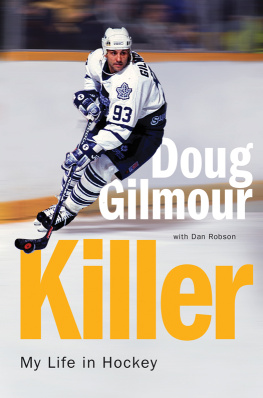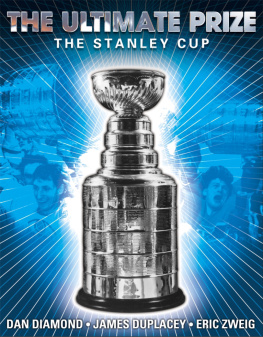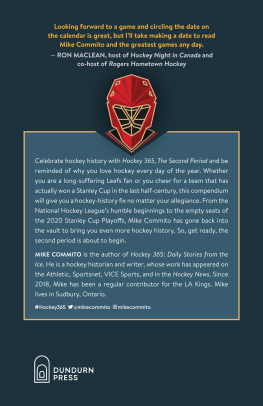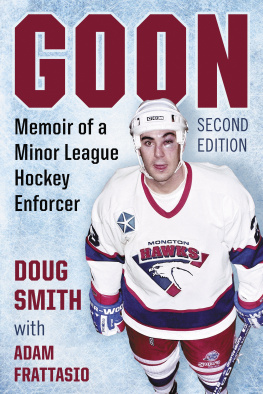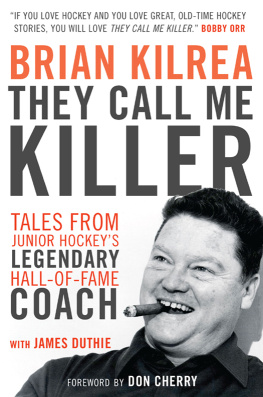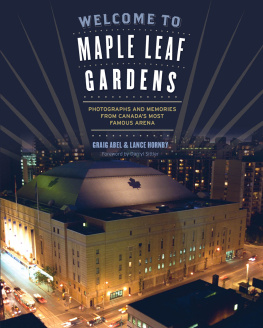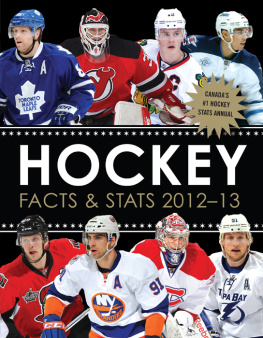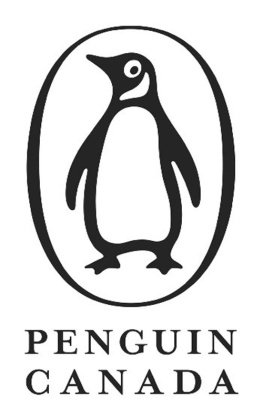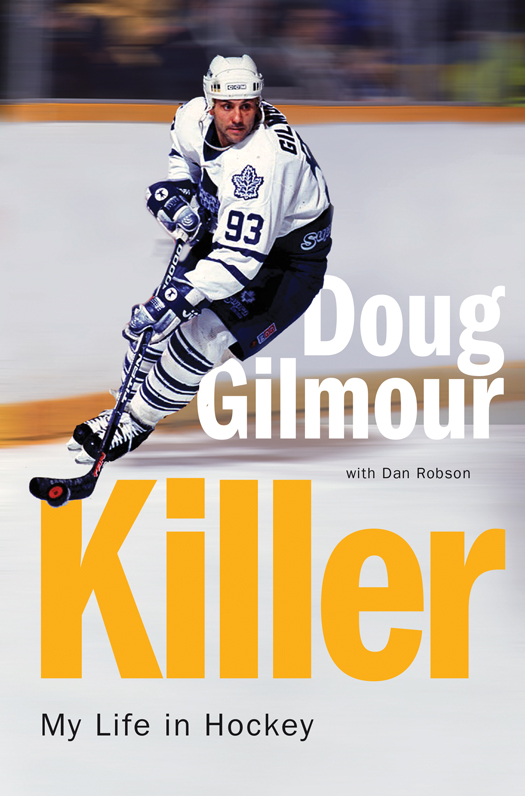A person shows what he is by what he does with what he has.
Anonymous
L ONG BEFORE THEY EVER called me Killer, I was known as Little Gilly.
I was only four, maybe five, then. My father was the coach of a bantam all-star team in Kingston, Ontario, where I grew up. His name was Don, but many people around town called him Gilly. Whenever the team played, I went with him, and so they called me Little Gilly. Each time, Id bring along my skates, and during intermissions Dad would lift me up over the boards and set me down on the ice. Id wheel around before the ice was cleared. The fans would wait around at the end of each period just to watch me skateI was like the teams mascot. I had a special team sweater and I wore these massive hockey mitts that didnt fitthey almost took up my entire arms. I didnt know that people were watching me back then. I didnt hear their cheers. I was too busy racing around the big, cold surfacestriding and striding... and wobbling... and stridingaround and around, trying to balance the puck on my stick. I would have kept going forever if theyd let me.
One time, during a tournament at Easter, the organizers gave me a trophy for my efforts. It was the first one Id ever received, and I was thrilled. In fact, I loved it so much that when I went to the same tournament the next year and they gave me a chocolate bunny, I was furious. For most kids, that would have been great. But I didnt want the damn bunny! I wanted a trophy. I wanted to be part of a teamand I wanted to win. I was so sour about it I started to cry.
Lets just say I was a competitive person from the start. That would get me into trouble on more than a few occasions. One time in particular still scares me to this day.
We didnt know how thin the ice was. First one there wins! my sister saidand she took off towards the big ship resting on frozen Lake Ontario, about 50 yards from the shoreline. We were supposed to stay close to the rink at the Royal Military College in Kingston. But we were curious kids. I couldnt have been more than 10 years old at the time. We had walked down to the bank beneath old Fort Henry after a game during a weekend hockey tournament, while our parents were still in the arena. Theyd told us to stay away from the lake. But the ship was huge and we wanted to see it up close. My sister Donna was a pure tomboy. A year older than me, and taller, too. It wasnt that she was tall for her age. I was just shortand skinnyfor mine.
Donna had a head start on me and my pal Ian MacInnis, or we would have had at least a chance of beating her. It wasnt a fair race. And so, Donna was several strides ahead of us when she disappeared.
She went through and didnt come up. Ian and I raced towards the black hole shed fallen into. I got down on my knees, then lay on my stomach and plunged my arm into the piercing cold water. I searched frantically while Ian held on to my legs. It must have been seconds, but it felt like much longer than that. I thought she was gone, trapped underwater somewhere beneath that thin sheet of ice. Thats when I felt her hand tug my arm. I didnt know how I was going to do it, but I knew I needed to get her out. I yelled at Ian to pull and he did. And somehow we heaved Donna out of the lake without going in ourselves. We scrambled to thicker ice, closer to the bank. She was drenched and freezing, getting colder and colder fast. And she was hysterical. She was probably in shock. A man saw us on the ice and came out to help. He helped us back to the arena, shivering and terrified.
Inside the RMC rink, adults covered Donna in blankets, trying to warm her up. Thats when we saw our parents comingand knew that although the worst was over, it was still about to get pretty bad. Mom and Dad had warned us. If they knew what wed done, wed be in so much trouble, wed be as good as dead anyways. Both of us. We had to think quickly.
Tell them I pushed you in a puddle, I told her. It wasnt the sharpest lie Id ever come up with. But Donna spun the story, and it worked. Even if Mom and Dad took the opportunity to ground me for a month. (We didnt tell my parents what really happened that day until years later, after Donna got married.)
You wont find many idyllic Canadian stories about pond hockey in this book, because ever since that day, I refused to play it. You wont get me close to the ice if Im not convinced theres a slab of concrete beneath it. Since then, Ive just never trusted the ice on a frozen pond or lake. I just cant bring myself to play that picture-perfect game of hockey in the great outdoors. Never will.
Something else stuck with me after the day my sister went through the ice. Even at that young age, Id already heard time and again that I was too short and too small. It was my flaw. It was the reality that would threaten to keep me from living my dreams of becoming a professional hockey player. But that day on the lake, it didnt matter how small I was. Sure, it was a burst of adrenaline. But it was also a burst of will. I needed strength at that very moment, and I found it.
It must have been there all along.
Of course, even though I knew I had the strength to do more than my stature suggested, it wasnt going to be easy to convince the world of that. And by world, I mean the hockey world. This was Kingston, after all. And in Kingston, hockey was all that mattered.
Kingston is known for being the first capital of the British province of Canada, designated as such when the colonies of Upper and Lower Canada were united in 1841. That only lasted a few years, but the city has served the country in many ways since. My hometown is considered to be one of the birthplaces of hockey. While historians argue about exactly when and where the sport began (there were certainly roots on the East Coast, and the first indoor game is said to have been played in Montreal), Kingston is home to the longest ongoing rivalry in hockey. Back in 1886, students from Queens College (now Queens University) challenged a group of students from the Royal Military College to a game on Kingston Harbour. The students had been playing shinny on the lake for a while, but this was the first official match. The annual meeting between the Queens and RMC varsity teams continues to this day, when the two meet to play for the Carr-Harris Cup. Although, these days they play indoors.
Over the decades, many great hockey players came from Kingston. And when I was growing up, they all seemed to play for the Boston Bruins. Hometown guys Wayne Cashman and Rick Smith both played for the Bruins in the late 60s and early 70s, when the franchise was anchored by the great Bobby Orr. Back then, the Bruins always had their training camp in Kingstonand the teams Senior A affiliate, the Aces, played out of the Memorial Centre on York Street. Seeing the team come through town every year built a strong connection between the city and the franchise. There were certainly a lot of Montreal and Toronto fans in Kingston, which sits almost exactly between both cities. But even today youll find holdover Bruins fans from the days when Kingston was the teams training camp home. On top of that, in 1974, another well-known local man entered Bruins lore, taking over as the teams coach: Don Cherry.
Throughout my NHL career, Don would always be a big supporter of mine. But long before he supported me, he coached and was a big fan of another Gilmourmy older brother, David. Hes 13 years older than me, and by the time I first started shuffling around on skates, he was already a local legend.

